| STUDY CIRCLE - 7 LIKING SWAMI VERSUS LOVING SWAMI PArt 01
GSS: 'We love you Swami!" We have uttered these words uncountable times to Bhagawan. But today, we will discuss what exactly we mean by the term 'Loving Bhagawan'. Is it loving just His physical form? Is it following His message? Or does it have to do with living His message? I would like to start this exploration with my own example. Every day, I do whatever Swami wishes me to do; I wake up in the morning, chant His name, do pooja and worship, and in the evening, I sing bhajans. I do all of these because I love Bhagawan. So is this what we mean by loving Bhagawan or is it something more than this? It is important to deliberate on this because many a times we find a dichotomy, where people say 'I do what Swami says. Is there something more that is expected of me? Does it mean that we have to literally live His message throughout our lives?' In short, let's aim to find out the purport of the words 'We love you Swami'.
AD: I am reminded of one very beautiful experience that happened in the Trayee Brindavan during the Trayee sessions. Bhagawan was sitting on the jhoola (swing) and in His inimitable style said, "So boys, do you love Me?" In response, there was a thunderous chorus, "Yes Swami, we love You!" Bhagawan's reaction, however, was very different. Nodding in disapproval, He said, "No, my boys don't love Me, My boys only like Me." Everybody wanted to now know the difference between 'loving' and 'liking' Bhagawan. And then Swami went on to explain this in a very beautiful manner, He said, "You have a dog at home and all along you pet the animal and caress it, you give it a bath and want to play with it, feed it, etc. But do you really follow the dog through every moment of its life. Wherever the dog runs, do you run behind it? No, you don't. Then, how can you say whether you like or love the dog?" And then, Swami said something that probably hurt a lot of us. He said, "My boys like Me too in the same manner. They want to be with Me and around Me, they want to feed Me and see Me happy but don't want to follow what I say." And then He said: "To love Swami is to follow Swami." On this note, let us rephrase today's topic as 'Loving Swami vs. Liking Swami'. Difference Between Liking Swami and Loving Swami GSS: That's beautiful. I think there is a profound difference between the two. Giridhar, what do you feel about this? SG: I think Amey has brought up a profound point. I say this because Swami would often tell us students that when we are in His presence, we tend to follow all the discipline that He expects us to follow but the moment we return home, we start watching TV, go to the movies and indulge in other past times. Probably, even I was a victim to this particular routine until a few years ago when we would conditionally or conveniently follow Swami's teachings as per our choice. For example, Swami has categorically mentioned that television is tele-visham - poison. It was actually surprising that as long as we were in Prasanthi Nilayam, we were somehow happy not to be able to watch television. But as soon as I got home, I don't know why but I would watch TV all the time. And I think that is something which differentiates liking from loving. As Amey says, true loving is to follow Bhagawan's teachings through every moment of your life, and not just when you are within His immediate vicinity. Bhagawan has reiterated this to us several times. GSS: Do you mean, it's not just about rituals but it is about embodying the essence of the rituals. Bishu, what's your take on this? BP: As Giridhar just mentioned, I can think of a few situations that most of us would have experienced. For instance, you see people who are very regular for bhajans and nagar sankirtan. You admire them for their commitment to making time and attending these sessions. But somehow you feel that their devotion to Swami does not extend beyond that. While one would think they epitomise the 'ideal devotee', you actually would like to see a better manifestation of the traits that Swami often talks about. In other words, instead of limiting the love to a few aspects of devotion, it must translate into everything that we do in our daily lives. GSS: In other words, we compartmentalise our 'love' or 'like' for Bhagawan and demonstrate our devotion 'now and then'. BP: I remember, during darshan sessions, most of the boys or devotees would reserve a place in the line and then go to drink water. When they return, if they find that their mats have been moved even by an inch, they would give a withering look to the person sitting next to them. But the moment Swami appears for darshan, they instantly flash their brightest smile.
KMG: Unfortunately, most of us are oblivious of the fact that we tend to do this. BP: I have also experienced this attitude quite often. GSS: But, the smile could also be interpreted as love for Swami. BP: Ironically, while the person is absolutely sure that the smile expresses love for Swami, it does not bother him or her that they have just hurt a fellow devotee with that harsh look. KMG: You will also find people who say 'we love Swami' and are ready to sacrifice their personal time, family and professional engagements, money and what not in the name of commitment to Bhagawan's mission. But they must also remember that they have to balance their rules in life. There are certain commitments that an individual may have towards his or her family and profession that must not be compromised in the name of Swami's work. In fact, Swami has often said that all work is His work. BP: That's right. KMG: I remember a young boy sharing his feelings with one of our senior faculty members. He spoke about how his mother was a Bal Vikas guru and was so immersed in Sai organisational activities that she had no time for her own son. She was not even giving the minimum attention that a child deserves from his mother. That is why in Swami's work if we have not learned to balance ourselves, then we have totally missed the point. All work is His work. What is True Love for God GSS: The understanding that is emerging now is that liking God is something very limited; it is selfish and narrow-minded and indicates an act of self-interest. On the other hand, loving God is when you love Him for His sake. You follow His message. The approach is selfless and unlimited. Let us now dwell a little more on how we first start with trying to love God, and then get so overpowered with several things that we unconsciously forget that we are not loving God but actually harming Him. We could illustrate this point with real life experiences and anecdotes. Bishu, perhaps you can give us your thoughts first? BP: I am reminded of a story from the life of Buddha. Ananda was His cousin and when Buddha attained enlightenment, Ananda decided to spend all his time with Him. But before taking initiation, he wanted to make sure that he is not treated at par with all the other disciples and wished to retain his status as the elder cousin brother of Buddha. So, he went to Buddha and said, "Being my younger brother, it is Your duty, Buddha, to obey me. After my initiation, you will become my master and I your disciple and I will not be able to ask or command anything. So, before I receive initiation, allow me to ask you a few things." Buddha said, "As you please, go ahead Ananda, what do you want?"
Ananda uttered his three wishes. His first wish was: "I should always be with you, you shall never talk to anyone in secret and you shall never send me away." GSS: He was exerting his copyright over God! BP: Yes. Ananda's second wish was: "Whenever I would like you to meet someone, at any time of the day or night, you shall not refuse." AD: Basically, he wanted Buddha to stay in a cage! BP: And here is the third wish: "You and I shall sleep in the same room, I should always be with you." After articulating the three wishes, he said, "Buddha, do not forget these wishes of mine. I am now ready to be initiated." GSS: Would you call Ananda's attitude as love for Buddha? AD: I don't think it was love. BP: There is lot more to the story! So Buddha says, "Fine, please get initiated." Ananda became His disciple and he was virtually the shadow of Buddha. He was always by His side. Many years later, when it was time for Lord Buddha to depart, He said, "By dusk tomorrow I shall be gone. Call all the monks. I want to address you all one last time." As the Buddha had wished, about 1,000 enlightened monks stood around Buddha - calm and composed. No one cried or showed any visible sign of grief – apart from Ananda. Ananda was in deep anguish. He was inconsolable and the other monks didn't know how to pacify him. Out of mercy, Buddha looked at Ananda and smiled. He asked, "Ananda, why do you cry, I have done everything that you wanted me to do. I have fulfilled all your wishes during this entire time that you have been with me." When Buddha said this, Ananda cried even more and said, "Buddha, I don't know what I will do with my life now. I breathed the same air that you breathed, I did everything that you did but I have not attained enlightenment and now I feel my life is hopeless. I don't know how to live without you."
Then Buddha said, "What can I do Ananda? I did everything that you wanted me do. I always knew that if I fulfilled your wishes, I would only be hindering your spiritual progress but you were not willing to forget that I was your younger brother. You wanted to retain all those privileges; your surrender was conditional." Buddha went on, "Perhaps my death shall make it unconditional." And then Buddha left His mortal coil. All the enlightened monks congregated in close proximity. It was a moment of deep introspection. Ananda alone was not present in that gathering; he had become a complete emotional wreck. He spent that entire night crying as he was helpless and alone. And, then he realised that although he had seen everything he had yet seen nothing. He understood that he had drunk from the fountain of nectar but he had not tasted the nectar. For the first time, he felt a void in his life. And, on that night, in that deep silence, began his process of self-introspection. During that night of profound self-discovery, realization dawned on him. And, as the morning broke, he was engulfed in a deep sense of peace. Over time, his process of self-realization deepened. Brothers, if we look at Ananda's example, when he was a shadow to Buddha during his lifetime, I would say that he only 'liked' Buddha. It was only after Buddha left His mortal coil that Ananda began to 'love' Him. If only Ananda had 'loved' Buddha when He was with him in the physical form, imagine what a wealth of spiritual development he would have gained for himself. STUDY CIRCLE - 7 LIKING SWAMI VERSUS LOVING SWAMI Part 2 Getting the Essence of His Message GSS: This is an insightful example, very thought provoking indeed. Ganesh, would you like to add to this?
KMG: We saw how Ananda totally missed the point. In fact, when most of us get into a ritualistic way of life, we forget the spirit behind our actions. It is important to be conscious about where our mind is at the time when we are engaged in action. This reminds me of a story of a Brahmin who lived right opposite a prostitute's house. One day, Gautam Buddha was to visit that village. The Brahmin was very confident that Buddha would be very impressed with his piety and respect to rituals and therefore bless his house first. To his utter dismay, Buddha blessed the prostitute first. The Brahmin's ego was hurt. He was furious with Gautam Buddha. So when Buddha came to his house, instead of greeting Buddha with pleasantries, he demanded an answer as to why he had to visit the prostitute's home at all and that too before his home. Buddha simply smiled and in the most compassionate tone said, "The prostitute is what she is because of some inevitable circumstances of her life. But in spite of your noble lineage and birth, you are always curious and interested about who is coming and going from the prostitute's house. What a tragedy that your mind is not on God whereas she probably may have more devotion than you." Does this not amplify the fact that we epitomise what and where our mind dwells? SG: Indeed, Ganesh. Your story does tell us that it is important to live by the spirit of the word of the Master. Allow me now to share a story.
It was dawn and two monks were walking by a river that was in a state of deluge. The monks wished to cross over to the other side. Suddenly, they saw a young woman standing on the bank that they were on, calling out for help. She requested the monks to help her cross the river. One of the them immediately carried the woman in his arms, crossed the river, and put her on the other bank. The two monks then continued with the journey towards their destination. It was almost dusk. Throughout the journey, the other monk looked very troubled. Wondering if he was suffering from some internal problem, the monk who had helped the woman asked him if anything was wrong with him. The other monk replied, "What you did in the morning was not right. How could you, a celibate, touch a young lady and carry her across the river?" This monk then smiled and said, "My dear brother, she was a person in need and that's all I knew, I didn't see it any differently. It has been 12 hours since I dropped her across the bank but it seems to me that you are still carrying her 12 hours hence." This story tells us that it is really about living by the spirit of the Master's words which is much more important than taking the words in their literal sense. GSS: And as Ganesh said where the mind is, that is where we really are. Talking of stories, I am reminded of a very humorous one that Bhagawan narrates. There was this learned person who used to narrate the story of Lord Rama every day to a spiritual gathering. His discourses used to extend to long hours. The devotees would assemble around him, listen and then move away as and when they wished. But there was one lady who would stay there right till the end of the talk.
The master was thrilled that at least one devotee was touched by his narration and cared to stay till the end. On the final day, he told her, "Mother, I'm really so happy that you have been sitting until the end of my talk. At least my narration has touched one woman among all the other devotees." The woman looked at him very puzzled and said, "Master, what are you saying?" He said, "You see, you are the only person waiting until the end of this narration." She replied, 'No, no, the mat on which you are sitting actually belongs to me. I'm just waiting for you to finish, so I can pick up my mat and leave." This story is humorous indeed, but is this not what happens most of the time with us? AD: And, Bhagawan has such a beautiful way of narrating such stories that it goes straight to the heart.
I think Swami has given us a powerful message through the story. Even when we sit opposite Bhagawan, we are so lost in His beauty and grace that we sometimes miss absorbing the messages that He shares with us. I am in fact reminded of yet another very interesting anecdote that Bhagawan used to narrate. There was a gentleman who gave up everything in life and went to the Himalayas and started a rigorous penance, which included some 16-17 hours of continuous meditation on a particular rock. Several months later, when he came to take his usual position one day, he saw someone else sitting on that rock. Absolutely shocked, he went up to this person and said, "I think you are sitting in the wrong place, this is my rock and I have been sitting here for days together, in fact months together and doing my penance." The other person looked at him and said, "There are so many other rocks here. You are free to go and sit anywhere and meditate." This yogi went completely berserk. GSS: This so-called detached person? AD: Yes, he had given up his family, belongings and city life before heading to the Himalayas. Sadly though, he got hold of a rock and grew attached to it. I guess in a sense, we all face the same predicament. We lose ourselves into the trees and in the bargain lose sight of the entire forest. GSS: I think it is becoming quite clear now that in the name of love, we actually look for something with a selfish motive. We are far more interested in our own personal happiness and joy. As Swami always says, 'If you love somebody, you must actually make that person happy rather than look for your own happiness'. I have a beautiful anecdote to share that took place recently when Bhagawan's physical form was not keeping too well. There was this devotee traveling with Bhagawan in the car when he thought it would be good opportunity to speak to Baba and voice his concern about His health. So he prayed to Bhagawan to cure Himself. In response, Swami instantly said, "Why? I am fine." The devotee did not give up and insisted, "No Swami, we cannot see You like this. Please cure Yourself." To that, Swami said, "But I am happy!"
Again, the devotee went on, "No Swami, but we are not happy because we don't feel happy looking at You like this." Then Bhagawan smiled and said, "Oh, so for your happiness you want Me to cure Myself." The message that He gave was loud and clear - that we are really not concerned about Bhagawan's happiness but in the name of love we are more concerned about our own state of joy at the sight of Baba. BP: We are stuck in that phase of 'what's in it for me'. The Meaning of 'Following His Teachings' GSS: If that is so, where then is the question of love? It cannot be more evident that the words 'I love Bhagawan' would require the devotee to follow His teachings in every sense because that is what ultimately makes Swami happy. This brings us to the next point. When we say 'following Bhagawan's teachings' or 'loving Bhagawan is following His teachings' what do we actually mean by that? Let's look at the first part of that question - following Bhagawan's teachings. What does that mean? One can actually argue saying, 'Fine, I meet Him in bhajans, I worship Him all the time; is that not following His teachings?' Amey, we would love to hear your thoughts on this? AD: I'm reminded of another beautiful incident related to the paduka pooja that used to be conducted every year. This happened during 1998-99. And you would know that this ceremony would typically have a couple performing prayers to the silver sandals of Bhagawan. On the conclusion of one such pooja, Swami called a few research scholars for an interview. After deliberating on a lot of things, Swami asked, "So, what is this paduka pooja?" One of the senior research scholars explained the concept and associated rituals to Swami. To that, Swami said, "No, no, no! That is not paduka pooja. Walking in the steps of the Master is the real paduka pooja which I want you all to do." Taking a cue from these words, I think loving Swami is about following His footsteps.
GSS: In fact, Amey, we have heard Swami speaking about Aushadham and Pathyam where Aushadham is medicine and Pathyam is the diet. When a patient goes to a doctor, it's always these two things that he prescribes to make the diseased healthy. While he needs to take the medicine, he must invariably follow a controlled diet. Bhagawan says the medicine is like loving Swami but the diet is about following His teachings. Then He says, "So if you, the patient, who is suffering from this ailment of the samsara (worldly existence), needs to get healthy you must a) love Bhagawan and b) follow His teaching. In other words, imbibe Aushadham and the Pathyam." AD: So well explained. SG: If I may add to that, in the Ramayana, Lord Rama himself defines what this love truly means for God. We all know the episode where Lord Sri Rama leaves for the forest to serve out his exile and Bharata pleads him to return and take back the kingdom of Ayodhya. Bharata says, "The king who actually asked you to go away, my dear brother, is no longer there. Why don't you come and take back the kingdom?" Lord Sri Rama had a great lesson that he wanted to impart at that moment but He did that through King Janaka. During this whole argument that went on between Rama and Bharata, King Janaka played the role of a judge. When it was time for the verdict to be pronounced, King Janaka said, "When there is a conflict between dharma and prema, where Bharata represents prema (love) and Rama represents dharma or right conduct, it is always love that wins over dharma. In other words, prema wins over dharma." Listening to this, all the people of Ayodhya erupted in joy thinking that 'yes, this is the verdict and Lord Sri Rama will come back because Bharata has won his argument'. But as usual, in His inimitable way, Rama gives a smile to Janaka, and King Janaka continues, "But prema too has its own dharma. Even love has its own dharma but what is the dharma of love?" He goes on to explain, "The dharma of love is that you need to ask your beloved Lord in what lies His happiness and implicitly follow those words. It is about not imposing on Him what brings joy and happiness to you."
Hearing this, we all know that Bharata immediately submitted himself to Rama after having realized what true love means. He accepted to rule the kingdom of Ayodhya on behalf of Lord Rama because in that lay the joy and happiness of Lord Rama. GSS: This communicates a message very clearly, does it not Ganesh? STUDY CIRCLE - 7 LIKING SWAMI VERSUS LOVING SWAMI Part 3 The Sweet Fruit of Sadhana KMG: Indeed. The subtle and right understanding of such concepts is very important even before we take the first step on the spiritual path. Talking of the first step, it is said that the essence of all knowledge and right understanding of scriptural text is practice. Unless and until we have made a sincere and systematic attempt to put into practice what we have learnt, we will be like the people who enjoy the food in recipe books alone and not what is placed on the plate. While on this subject, a classic example that comes to mind is an instance from Swami Rama's life. When he was giving some spiritual lessons to a small group of very ardent followers who were sincerely taking notes, a very assuming man came and joined this group of students. He seemed to have a carefree attitude and didn't take any notes. As can be expected from any teacher, Swami Rama accosted him for not taking the lessons seriously. The man replied bluntly, "What you are teaching is sheer bookish knowledge. I possess knowledge born out of conviction, springing out of direct practice and experience."
Swami Rama was obviously taken aback and demanded this man to share his so-called practical knowledge. Just then the man saw an ant trying to scramble past. He took the ant in his hand, broke its body into three parts, kept them separately at a reasonable distance, and closed both his eyes. Within a few moments, the three parts of the body joined back into one. The ant came back to life and scrambled away immediately. Needless to say, all were stunned by this feat and Swami Rama asked this man with all reverence as to where he had learned the art. Pat came the reply, "From your guru." Until then, Swami Rama had thought that he was his guru's favourite disciple. The man's reply made him wonder how his guru had taught a stranger the feat of mastering death. Furious, he ran straight to his guru and demanded an explanation for keeping such an art away from him. The guru calmly replied, "He practices whatever I have taught him. If you practice the same, all good things will be bestowed upon you too." At this juncture, I must immediately clarify that the purpose of narrating Swami Rama's episode in our current discussion is not to glorify the power of occultism or the siddhis that a seeker may acquire during certain spiritual practices, which in fact can be a source of distraction on the ultimate goal of self-realisation. The point I want to drive through this episode is that one ounce of practice is worth more than tons of bookish knowledge.
SG: There is a beautiful narration by a great spiritual master called Nisargadatta Maharaj in his book 'I Am That'. The book is a compilation of various conversations that devotees have had with him. I would like to quote verbatim from the book. It touches upon our conversation here today – as to what rewards can one expect to gain by putting into sincere practice the teachings of the Master. In the book, the questioner asks Nisargadatta Maharaj, "How does one come to know of the Truth as you have done?' Nisargadatta Maharaj says, "I can only tell you what I know from my own experience. When I met my guru, he told me you are not what you take yourself to be. Find out what you are, what's the sense of 'I am', find your real self. I obeyed him because I trusted him. I did as he told me. "During all my spare time I would spend looking at myself in silence and what a difference it made and how soon! It took me only three years to realize my true nature. My Guru died soon after I met him but that made no difference, I remembered what he had told me and persevered. The fruit of it is here with me". BP: Wonderful Giridhar, this is really profound! I am reminded of another great personality from whom we can learn how to practice the teachings of the guru. It is King Janaka. In a forest near Mithila, sage Suka was teaching the concept of Atma Tatwa to his disciples when King Janaka personally went to sage Sukha and prayed that he be accepted as one of the disciples. Sage Suka readily agreed to this request. Every day, the session would start at a particular time and King Janaka would arrive promptly after attending to all his duties as a king. One day, the sage came early for the class and the other disciples were also present. However, King Janaka was yet to come. The sage waited for the king to arrive. This somehow irked the other disciples. They thought how could an enlightened sage be partial to someone just because he was a king and had wealth and power.
After a few minutes however, King Janaka arrived and sage Sukha started the class. The sage, of course, knew what was going on in the minds of the disciples. Through his mystic powers, he created a situation where all the disciples saw that the whole of the city of Mithila was on fire. The moment they visualised this, all the disciples ran helter-skelter from the class as they wanted to protect their belongings, their house, clothes, whatever. The person who did not move from his place was King Janaka. He was motionless. Sage Sukha even told King Janaka that his palace was on fire, but that did not bother him. Soon enough, all the disciples returned and reported that everything was fine in the city and nothing was burning. Then sage Sukha explained how each one of them ran to protect a small house of theirs while King Janaka who had a palace was totally unaffected. He went on to explain how King Janaka's love for the guru was the maximum because his attention on his teachings was the maximum. And that was also the reason why he gained the guru's maximum love. AD: With this, I am reminded of one of our brothers who was on duty to push Bhagawan's chair a few years ago. It so happened that he had an opportunity to ask Swami, "Swami, amongst the various relationships that you talk about in your discourses, which is the best relationship that we can have with You?" Apparently, at that moment, Swami did not answer, but later, as he was taking Bhagawan's chair out, Swami turned back and said, "The best relationship that you can have with Me is that of Guru-Shishya (Master - disciple)."
And then Swami went on to say, "In every other kind of relationship that we can have, there is some amount of selfishness or there is some amount of conditionality. Whereas between that of a master and a disciple, there are absolutely no conditions attached. The master simply loves the disciple out of the feeling that his disciple must progress and the disciple in turn loves the master because he has to simply follow the master." GSS: I think now it is clear that when we say 'Bhagawan we love you', it means we must follow His teachings. However, from the examples of either Swami Rama or King Janaka or Nisargadatta Maharaj - the important thing we have learnt is that the practice of these teachings eventually led to their individual transformation. Let us now move to the next level wherein we say 'Yes, Bhagawan, we will follow Your teachings' not just in letter but in spirit too if we are to bring about a change in us. By merely saying, 'following Your teaching' again and again would be as meaningless as saying 'I love you Swami. I love you Swami' without actually living up to that love in all sincerity. Here, I am reminded of one occasion when Mr. Indulal Shah who was heading the global Sathya Sai Seva Organisation met Bhagawan just before leaving for a Sathya Sai service meet overseas. He asked Swami, "Bhagawan, could you give me some message that I can communicate to all the devotees abroad?" Swami gave a beautiful statement in reply, He said, "Tell them what service they do is not as important as what that service does to them." In other words one needs to question, "Is this service changing me? Is it transforming me? Am I becoming less short-tempered? Am I becoming more compassionate?" If all this is not happening to the individual, Bhagawan says there is no point in engaging oneself in any sort of service. GSS: So, let us look into how these teachings can lead to personal transformation. Bishu, can you give some examples of devotees where following Bhagawan's teachings has actually led to a personal transformation? BP: What I am about to share has nothing to do with a devotee who has had this transformation. On the other hand, it is about how Swami emphasised this message to a very dear devotee. It is an interaction that Mrs. Rani Subramanian who is lovingly called Rani Ma had with Swami sometime ago. Rani Ma, as most of us would know, went through a deep spiritual quest and Swami guided her and her family on the spiritual path. He also granted her and her family several interviews and opportunities for interaction. One day, her daughter asked, "Swami, You have been so good to our family now. How do we retain this grace? Will you be granting us such chances continuously?" She wanted to ensure that her family's interactions with Swami do not stop. Then Swami said, "You are getting all these chances not because you are coming to Puttaparthi or you are having My darshan. The only way to ensure that you get complete grace and my poorna krupa (complete grace) is by holding on to My teachings." Swami continued, "I am not important, what is important are My teachings. If you get inspiration by coming to Puttaparthi, then you must come but if you come here and feel disturbed or if you are not able to progress on the spiritual path, then you need not come here. What is important is that you follow My teachings. Coming to Puttaparthi is not all that important."
GSS: Coming from Bhagawan Himself, this is so amazing. Amey, do you have any such memories to share? AD: I am reminded of one occasion when in 2005 we were in Kodaikanal and Swami asked us to go for bhajans in the evening. Typically after a round of tea in the afternoon, we would have a session with Bhagawan. At the end of it He would say, "All of you now go for bhajans." During that particular session as He was asking us to leave, He said, '"So, does everybody like bhajans?" We all replied, "Yes Swami." Then, in a humorous tone, Swami said, "So much devotion, oh, so much devotion you all have." And as He got up, Swami said, "I don't want your devotion, I want transformation." I think He meant that devotion does not come on a Thursday or a Sunday evening or only when you go to Sai Kulwant Hall every day at 6.00 pm. It is not uncommon that when we step into Sai Kulwant Hall, we are in a supreme state of devotion. We shed a tear or two for God and all of that. But the moment we step out, we are back to our old selves. Swami has also said, "Devotion ostundi pothundi (devotion can come and go) but when transformation comes, it stays with you." In short, the gift of devotion must be expressed in the transformation of the individual. STUDY CIRCLE - 7 LIKING SWAMI VERSUS LOVING SWAMI part 04 KMG: On the same lines, I remember one of the senior brothers saying that on one of those occasions when he had the opportunity to walk with Swami, one of the devotees shouted, "I love you Swami". Instantly, the Swami replied, "Don't love Me, just love My teaching."
SG: Swami has always emphasised on transformation and it was something that was very dear to Him. I remember a beautiful incident that took place in 1999. A group of MBA students were seated in the front rows in the Mandir and as Swami came for darshan, they all shouted out to Swami saying "Swami interview, Swami please, interview Swami." And, you know how Swami loves to crack jokes with boys. He said, "Get your wives and I'll give you interview." Everybody laughed out loud as they thought Swami was just joking. And, they continued to say, "Swami we love you, Swami please give us interview" and all that. Then, Swami turned and with a very serious demeanour said, "Eh, your mind is your wife and your atma or soul is the husband. If your mind and the atma are in perfect state of understanding, there is peace and harmony at home but if the mind and atma have diverse opinions or if they think differently, the result will be 'diverse' and that will lead to a catastrophe." Swami was actually playing on the word 'diverse' (divorce). So, when Swami said "Get your wife' I'll give you interview", He meant "I am your soul, let your mind ever be on Me, then you will automatically gain that inner view." I think this is the most important step towards transformation. KMG: Speaking of devotion transmuting into transformation, Swami has said that the river of devotion should flow between the banks of duty and discipline. Even devotion must be regulated in the disciplined channel and this calls for training the mind for applying the brakes. In modern times, we all have become inflicted with an addiction to speed. We want everything to move fast. We seek instant gratification. This is why the young generation, always bubbling with energy, enthusiasm and passion, is reminded to be careful and more self-controlled when they get restless. Self-control is synonymous to applying the brake; it may seem to be contradicting the freedom, the intense speed with which one wants to achieve his ambitions but it is this self-control that stops the individual to take the short cuts that are more often than not the wrong cuts of life. I am sure brother Sai Giridhar will agree with me, out of his immense experience in bike and four-wheeler stunts that better the brakes, the more confident is the biker. SG: Not just that, Ganesh, you also need to know when to apply the brakes. KMG: So, we must train our mind to apply the brakes when and where required in order to avoid the accidents. We need to strike a balance between the accelerator and the brake - this is the spirit behind the word 'self-control' that ultimately leads to transformation. BP: This is how our devotion can really transmute into transformation. GSS: So, what is most dear to God is when you follow His teachings and that leads to transformation. I am reminded of a very nice anecdote that happened during our student days. Bhagawan would put us through these ups and downs that the students are typically aware of. And, it was one of those periods when Bhagawan was very unhappy with His students and stopped talking to us for days. We ultimately reached a breaking point and decided to seek Bhagawan's mercy. All of us got together as a team and when He came out for darshan, we rushed to Him, held onto Him and said, "Swami, please forgive us, please forgive us."
Bhagawan gave us a strict reminder about discipline and said, "All are watching, don't do this." Gradually, our refrain of "please forgive us" became "please Swami, please Swami". We kept saying that over and over again. And then, beautifully, Swami punned on our words. He said, "What are you saying 'please Swami, please Swami'." He said, "You 'Please' Swami, then automatically I will talk to you." Isn't that so beautiful? How do we please Swami? By following His teachings! Bhagawan communicated this in such a simple way that made a deep impact on our minds. One sentence from Bhagawan but it says it all. I think we should not conclude this discussion without mentioning one more point. The moment you say "follow Bhagawan's teachings", people typically say, "Oh come on now, I love Swami. Isn't that enough?" They respond in this manner because most people generally believe that to follow Swami's teachings is very tough. We remember the great saints and sages who had to walk the bed of thorns and cried all the time. So somehow there is a feeling that devotion is a tough path to walk on. Little do they know that 'I love Swami' is a very easy path to traverse. Here I would like to recall Mother Teresa's episode. We all know that she did tireless service in catering to and serving the aged people and the lepers who were almost on their deathbed. While treating a person who had fallen into a drain; there were a lot of maggots on his body and his body was stinking, Mother Theresa's biographer saw this and said, "Mother, how could you be doing this? The stink is unbearable. I wouldn't do this for a billion dollars." To this, she replied, "I am also not doing it for a billion dollars. I am doing it for God, for Jesus." So for her, her experience was very pleasant but the onlookers experience was, 'oh how could you be doing this?' So, many a time we assume and make a judgment that something is very tough or difficult. But do we ask the person if it is tough for him or her? 'Is the Spiritual Path Always Painful?' Let us elaborate on this before we wind up the discussion. Is the Spiritual Path Always Painful? KMG: In fact, on one occasion Bhagawan was asked by an earnest devotee as to why some of His dearest devotees such as Meerabai and Sakhu Bai had to go through so much suffering and travails, to an extent that their spiritual path seemed to be strewn with strain and tribulation. Swami replied, "Did Sakhu Bai or Meerabai come and tell you that they were suffering? That is your perception." Truly, it is a misconception that the spiritual path is full of trials and tribulation. And, if you actually ask the devotee who is going through the test about how tough the journey is, you will find out he or she is usually oblivious of all the suffering because their focus is on God, on the beloved. GSS: I think the Pandavas also never complained during their period of exile. It is we who feel that they went through so much of suffering. KMG: That's why it is important that we are not judgmental about others' behavior because it could just be a figment of our imagination. BP: When I decided to stay back in Prasanthi Nilayam, a lot of my class mates and friends always felt, 'oh my God, you have done such a big sacrifice'. Frankly, I have never felt like that. I actually felt the opposite! It is they who were giving up the joy and fulfillment that one experiences from staying at Prasanthi Nilayam and doing God's work. And, while you are in such close proximity to the Divinity, you somehow end up feeling that anytime you need something, Swami will provide it and it happens! So, people who choose to believe that in following Swami's teachings, life becomes strict and disciplined, or completely boring with no fun or colour - I think these are all but figments of their imagination. AD: On the contrary, it is the most joyful experience. BP: Yes because things pan out so beautifully in life. GSS: Despite the ups and downs, there is no doubt that it is the most fulfilling experience. BP: Ganesh was speaking of saints, and I am reminded about the story of Father Damien who was sent to the Hawaiian settlement in Molokai. This was a small island where lepers were quarantined off to. And when the Bishop of Hawaii wanted to send a priest to that settlement, Father Damien volunteered to offer his services. He was sent with the instructions that he must not go too close to the diseased. The selfless person that he was, Father Damien had no reservations about mingling with the lepers as he felt committed to serve them, build houses and a school for them. He nursed them day and night. Soon enough, he fell sick.
Father Damien epitomized the prayer that he would often recite: "Lord, you gave your life for all of mankind, how can I call myself a follower of Christ if I am not willing to give myself away in service." Yes, he succumbed to that disease but had no regrets. He lived a great life and enjoyed every moment of being there for the other person. SG: We have now discussed several instances of the experience of a person who has 'experimented' to love God, if I may say so. But I think the fundamental issue still remains the question that we started off this discussion with – the question of 'how do I go about following God's words and all that, oh it's a very difficult thing to do'. Allow me to narrate a most wonderful experience when some of us had made a trip to Rishikesh Vashishta Gufa, the cave of Sage Vashishta that Swami Himself had visited in the year 1961. We met a Swamiji there by the name of Swami Shantananda. He spoke to us about sadhana and about practicing the teachings that Bhagawan has taught us. One of us suddenly spoke up and said, "But Swamiji, the teachings are so difficult to put into practice." To that, Swami Shantananda immediately pounced on us saying, "See this is the fundamental problem. You yourself put a barrier right in front of you!" AD: Mental block. SG: Yes, a mental block before anybody else can erect that barrier in front of you. Most of us would know that the first fundamental barrier is the one that we put in front of our own selves. The Swami went on, "Unless you remove this barrier, how will you ever experience this joy of following God's words?" He continued, "Try for a week, a month, a year, and you will experience the joy. And it is that experience which will take you forward in life." Swami said it's a step by step process and all that we need is perseverance to try or experiment loving God in that manner. AD: I agree it's a step by step process that gradually contributes to our spiritual growth. Most of us think that it's a quantum leap on the lines of – "I am like this from tomorrow, I am expected to be like that" as if it's an overnight miracle that will change you. BP: You feel the change is so steep that in the bargain you end up saying you cannot go through it, and that you cannot walk on the path. AD: It is thoughts such as this that gives us this mental block. In this regard, I am reminded of a beautiful prayer that I had read somewhere which goes something like this, 'Oh Lord, forgive me for I am not what I ought to be, but thank you Lord for I am not what I used to be'. I believe that gaining spirituality is a step by step process, similar to the experience of Sabari who went through the process day in and day out. Eventually, the Lord came. Similarly, our spiritual progress can also be a day to day process. GSS: Amey, why don't you share one of your personal experiences to illustrate how this happens? AD: To me, following Bhagawan's teachings has been an extremely joyous experience. It started off with a lot of pain. When Swami would say, 'Love all serve all' – it would be the most difficult thing to do and I would think how could anyone love all and then serve all? So I took it up as a challenge. As we all know, Swami always radiated love. Anyone who came to Bhagawan would be mesmerized by His smile and forget all their problems. I asked if I could also lead a life like that. I took that one message of Bhagawan and tried to implement it in my own life. And, the outcomes have been beautiful. I would like to share an experience to explain my point. I was travelling by train and as is the norm, we have all sorts of people coming and going - beggars, hawkers, etc. There was this person who came up to me and started pestering me to give something to him. Sadly I did not have enough in my pockets to offer him anything and I felt this burning anger beginning to build inside me. That was when I suddenly thought, 'Okay this is the time when I can start practicing Bhagawan's teachings' – to radiate my love towards the person asking me for something. All of a sudden, I looked at this person and gave him a beautiful smile. I prayed to Swami pleading Him to pour forth His love through me to this person. Within the next few seconds, it felt a miracle of sorts when this person looked at me, smiled and just walked away. I have had several such experiences with regards to radiating love.
BP: A classic example is that of Phyllis Krystal transforming the hijackers. We will not go into that but I think it is a beautiful example of this concept. SG: I have an experience to share too, although quite trivial in comparison but one that physically impacted my life. I was suffering from migraine for more than a decade. I tried all sorts of medications for the first four to five years. Yet nothing seemed to help me. Once, I even prayed to Bhagawan saying, "Swami, there is this kind of a headache which keeps coming, what should I do?" And Swami said, "Cheptanu, Cheptanu" (I'll tell you, I'll tell you). Years passed and we once travelled to Chennai. During this trip, He advised us that coffee and tea were bad for health and asked us to stop having them. GSS: That would have been tough. SG: Yes, and that was the thought going through our minds. It was tougher for me because every time I had a headache, it was natural for me to run for a cup of coffee or tea and here Swami was asking me to stop both. Of course, Swami never imposes anything on us. He only says, something is not good or not advisable. He leaves the choice to us. I of course took His advice and stopped having coffee and tea. It's been five years now and I have not had a single instance of migraine since then. I would never have correlated coffee or tea with migraine, but that was the cure! So practicing Swami's teachings or His words have a far more profound effect on us than we can even comprehend.
BP: I want to add to Amey's observation about radiating love. I have experienced in my life that whenever I do not share a cordial relationship with someone and feel it cannot be solved with just a frank chat and I need to do something more, I sit down to pray. And the next morning, I envelope this person with my love and do it really sincerely and whole heartedly. Each time, this approach has worked. It may not work immediately, but it does eventually. GSS: How does it work, what happens? BP: You suddenly see warmth seeping into that relationship. Earlier whenever you meet that person, there would have been a lot of negative energy. But slowly that transforms into positive vibes and then you start warming up and things become normal. SG: I agree with Bishu's words because I have had a similar experience. I used to share a room with a brother but somehow I had developed an aversion towards him because of the difference of opinion we would have. But then there was this strong feeling in me based on Swami's message - Love All. I thought to myself that I cannot afford to hate anybody in this world. With all my heart I prayed to Swami asking Him to show me some way to help start loving this room mate. In one of His discourses, Swami had given this methodology of doing it. He says if you cannot come face to face with a person whom you don't like, when you are away from them sit and pray for them from the bottom of your heart. Pray for them that they are happy in their life, that they follow Swami's teachings and grow very near and dear to Bhagawan. By practical experience, I have found that such selfless prayer helps. Today, when the roommate and I meet, we are able to look into each others' eyes.
We are very comfortable with each other and we exchange pleasantries; it's a perfectly harmonious and loving relationship between the two of us. And it is merely the miracle of prayer that has brought this about. GSS: These are lovely and beautiful experiences. Basically, this whole process of following Swami's teachings becomes very enjoyable when you do it with the right spirit. And then in a way every moment becomes a miracle. As Bishu just said, your whole relationship changes because of every small experience. BP: You start to notice all the tiniest miracles that begin to happen in our lives. GSS: Then it's no more a manifestation of vibhuthi or manifestation of nectar which are of course miracles in their own way, but what becomes more important are the subtle miracles - the timing, the circumstance, somebody just coming to you and telling you a word that changes your life, and so on. In fact, I would like to quote one very beautiful anecdote. This is about a student who was educated here from the primary school and is now in the institute. He once told me that during his primary school days, he lost his socks. Perhaps, it was sports day then and he had left his shoes outside. Feeling bad, he went and told his teacher about it. He thought he would get some sympathy from her. Instead she scolded him and said, "Can't you even take care of your socks?" This put him off so much that in the evening when he went to the Mandir he had a dull look on his face. At this point, something totally unimaginable happened. Bhagawan came out of the interview room with a huge basket. He came straight to the primary school students and was just about to distribute something to them. Guess what it was? All: Socks! GSS: Yes, socks!
The young boy was taken aback and thought it was too much of a coincidence. The teacher distributed the socks to them and he was extremely happy, but the masterstroke was still to come. Bhagawan then picked up a few socks asking every student, "Did you get, did you get?" He came close to this boy and without asking him, He threw an extra pair of socks at the boy. All: Wow! GSS: This student says that one event of Bhagawan's omnipresence and omniscience changed his life forever. He did not need any further proof of God's presence; the presence that makes our entire journey a miracle every minute and every second. It's no more about one day or a particular event. KMG: Life becomes so much more meaningful in this knowledge. GSS: Very meaningful and enjoyable too. To sum up our discussion today, we have started with the whole theme of 'Loving Bhagawan'. We also clarified our understanding of the words, 'We love Swami' – that is it is not about liking but about truly loving. And, true loving is about following His teachings. Again following His teachings should not be just limited to following His instructions on paper but one that leads to individual transformation. Ultimately, this whole process is not a very difficult and stressful journey but an enjoyable process that makes every second of our life memorable and fulfilling. AD: Let us all hope and pray that we truly love Bhagawan the way He wants us to. GSS: In doing so, let us all endeavour to please Him. BP: Let us now end this session as we end every study circle - with a prayer. Om Samastha Loka Sukhino Bhavantu Om Shanthi Shanthi, Shanthihi |
PLATICAS DE SATHYA SAI BABA
DIOS ES AMOR
LA VOZ DEL AVATAR
SITIOS SAI
miércoles, 13 de junio de 2012
LIKING SWAMI VERSUS LOVING SWAMI & Other Updates
Suscribirse a:
Enviar comentarios
(
Atom
)











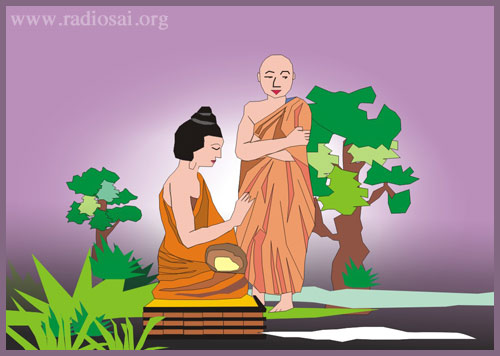
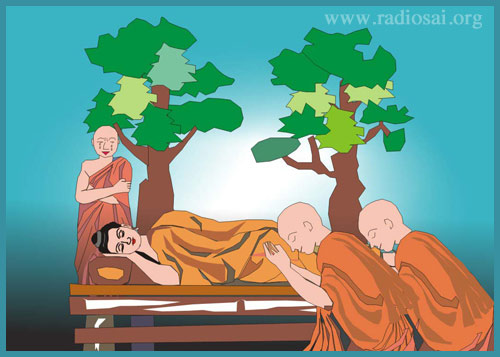


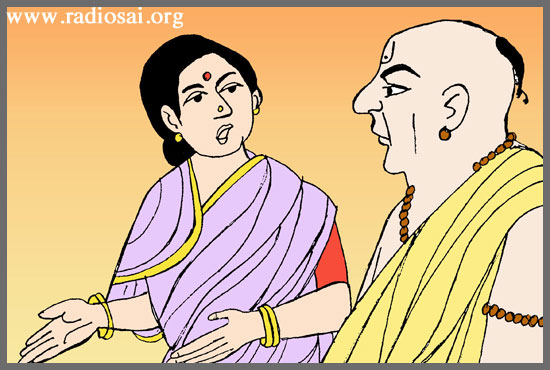
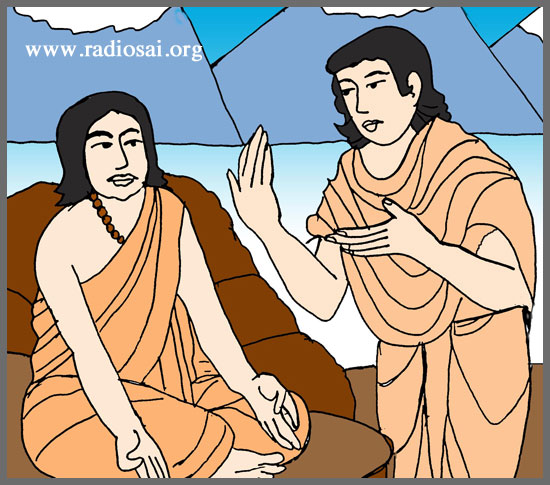

























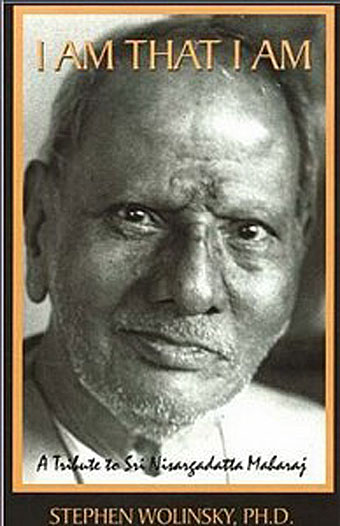
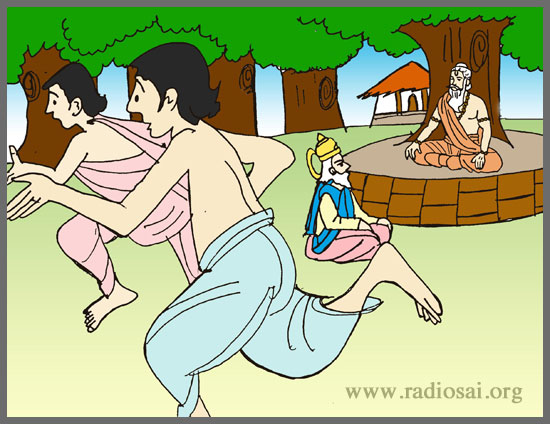
























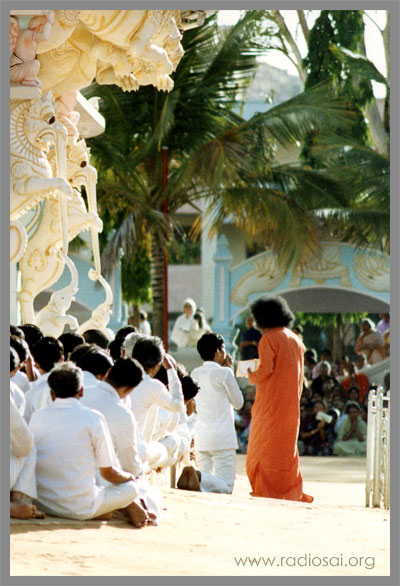

























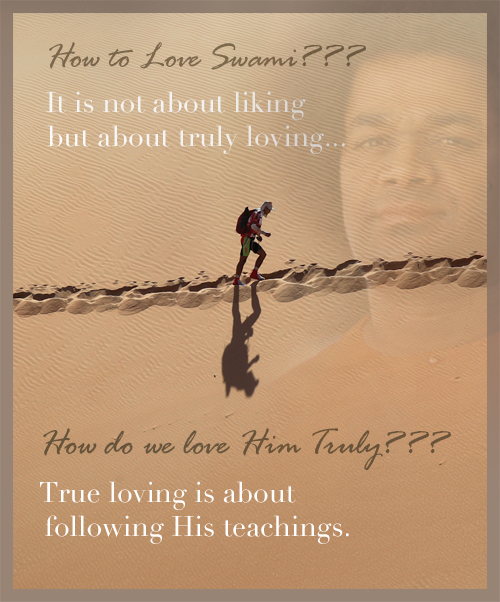














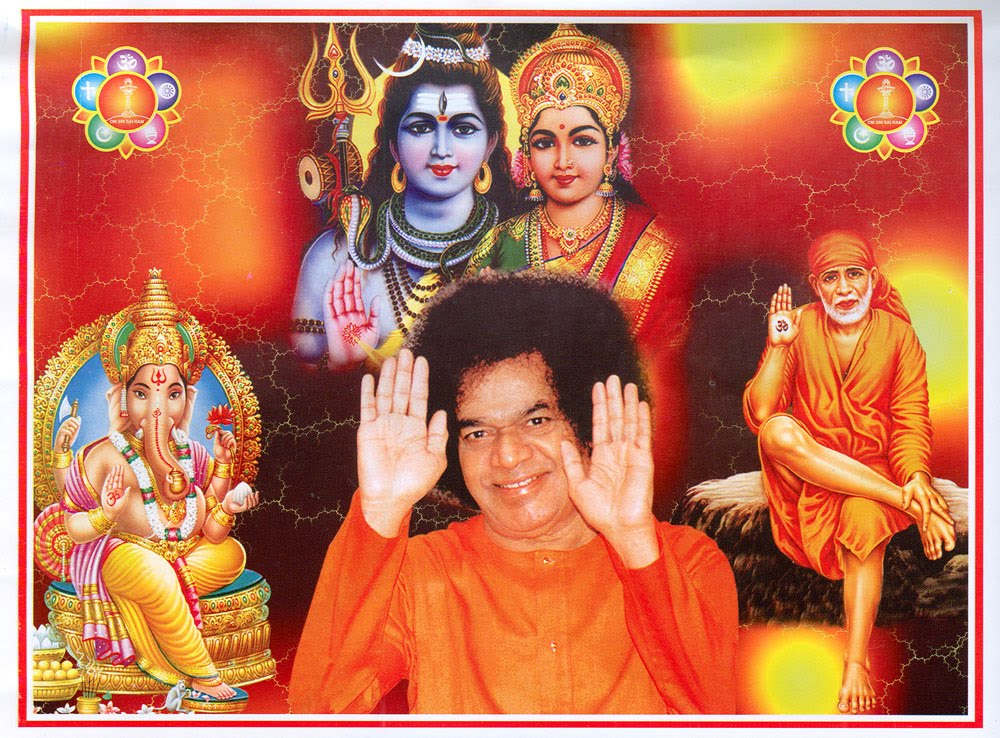






No hay comentarios :
Publicar un comentario